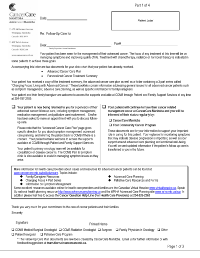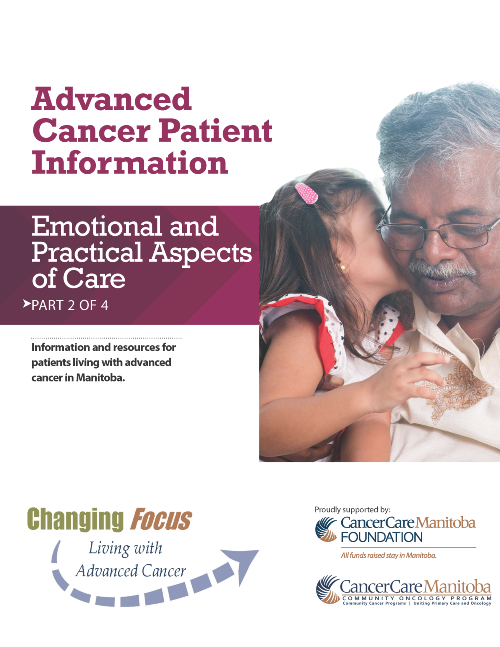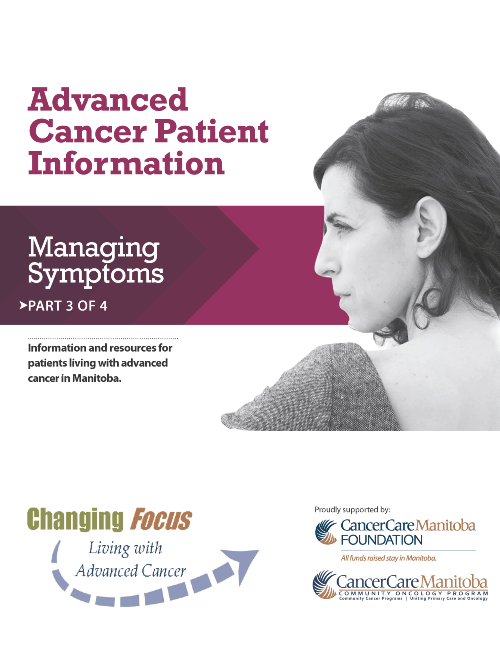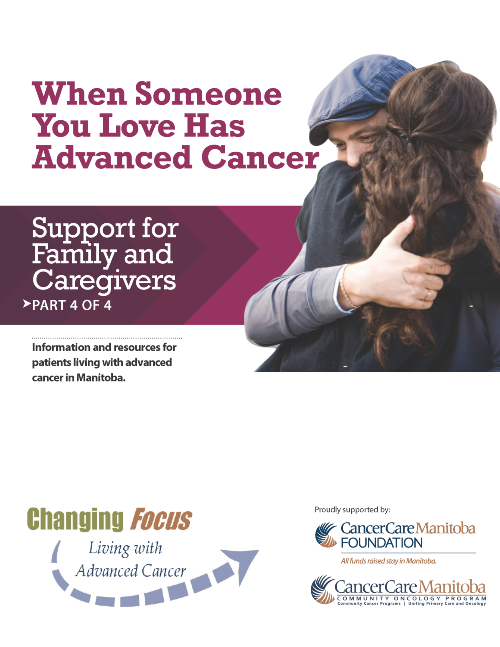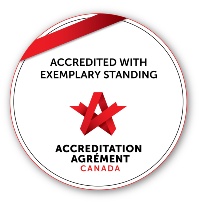Living with Advanced Cancer
The Changing Focus: Living with Advanced Cancer Initiative at CancerCare Manitoba is working to support patients with a diagnosis of advanced cancer by developing follow up care plans. Your follow-up care plan (Part 1, 2, 3, and 4) was given to you at your most recent clinic appointment with your oncology team. Your follow-up care plan is made up of four parts:
Part 1 - Advanced Cancer Care Plan
This is an individual patient plan that outlines your cancer history, as well as symptoms to watch out for, and the care you may need going forward. It looks like this:
Part 2 - Emotional and Practical Aspects of Care
This booklet will help you think about decisions you may need to make in the future, as well as practical information on programs that can assist you. This booklet also contains information about provincial resources and services. It outlines the programs or people available within CancerCare Manitoba to meet the needs you may have related to your advanced cancer.
Part 3 - Managing Symptoms
This booklet will provide you with information about symptoms (pain or discomfort) you may experience and the various things that can be done to manage the symptoms. Several symptoms are described in this booklet. Some symptoms you may experience and some of the symptoms you may not feel at all.
Part 4 - Support for Family and Caregivers
We've heard many caregivers or family members of patients with advanced cancer say they wish they had known some things earlier in the cancer experience. There are many tips included in this booklet. Use this book in whatever way works best for you, as the caregiver of someone living with advanced cancer.
Palliative Care Services and Resources in Manitoba
When cancer patients transition into palliative care, it’s important their needs are understood so they receive effective support. Healthcare providers have several resources they can use, from how to access specific medication to managing pain and symptoms. The health care team at CancerCare Manitoba can help to link you with the program that is available where you live.
Palliative care services are offered in each of Manitoba's Regional Health Authorities (RHAs). To identify palliative care resources in your community, contact your RHA. Each RHA has developed a palliative care application referral form.
The WRHA Palliative Care Program is also a resource. Health professionals experienced in managing complex palliative care issues are available 24 hours a day for consultation with other healthcare professionals to assist in the care of adults and children with a life-limiting illness, and to support healthcare teams involved in their care.
Health Authority - Palliative Care Contact Information |
Phone Number |
|
| Winnipeg Regional Health Authority | 204-237-2400 | |
| Southern Health - Santé Sud | 204-388-2038 | |
| Interlake-Eastern Regional Health Authority | 204-785-7739 | |
| Northern Regional Health Authority | Western Area | 204-623-9661 |
| Eastern Area | 204-778-1450 | |
| Prairie-Mountain Health | Southwest Area (West of Hwy#10, South of Riding Mountain National Park) | 204-747-1832 |
| Southeast Area (East of Hwy#10, South of Riding Mountain National Park) | 204-578-2307 | |
| Brandon Area | 204-578-2340 | |
| Northern Area (North of Riding Mountain National Park) |
204-629-3006 |
|
Manitoba Health's Palliative Care Drug Access Program provides deductible-free medication for patients with advanced life-limiting illnesses receiving palliative-oriented care. An application is required and should be forwarded to your RHA palliative care co-ordinator.
If you have questions about palliative care, please contact the following:
CCMB Symptom Management and Palliative Care Program:
Physicians
Phone: 204-237-2033
Nurse practitioner
Phone: 204-787-2860
These CCMB-recommended online palliative care resources may also be helpful.
- Palliative.info is a Manitoba website with information about palliative care topics, services in Winnipeg and Manitoba and links to other palliative care organizations.
- Canadian Virtual Hospice Canadian Virtual Hospice (CVH) is an internationally recognized resource for people dealing with life-threatening illness and loss. The website has excellent resources for health care providers.

